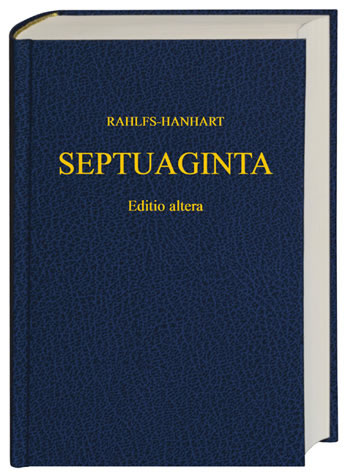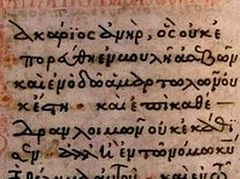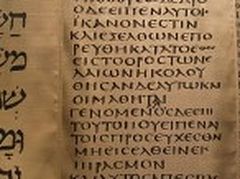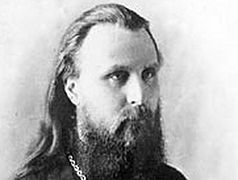Does the Orthodox Church teach that the Septuagint is more reliable than the Hebrew text of the Old Testament? If so, why? Fr. John Whiteford talks about the "Bible according to the Seventy".

In the "Encyrlical of the Eastern Patriarchs" of 1848, which was a reply to the epistle of Pope Pius IX, "To The Easterns," the Patriarchs of Constantinople, Alexandria, Antioch, and Jerusalem, along with the other assembled bishops stated: "Our Church holds the infallible and genuine deposit of the Holy Scriptures: of the Old Testament a true and perfect version, of the New the divine original itself." And so we have always held that the Septuagint is the authoritative version of the Old Testament.
Metropolitan Hilarion (Alfeyev) notes:
...the basis of the Old Testament text in the Orthodox tradition is the Septuagint, a Greek translation by the "seventy interpreters" made in the third to second centuries BCE for the Alexandrian Hebrews and the Jewish diaspora. The authority of the Septuagint is based on three factors. First of all, though the Greek text is not the original language of the Old Testament books, the Septuagint does reflect the state of the original text as it would have been found in the third to second centuries BCE, while the current Hebrew text of the Bible, which is called the "Masoretic," was edited up until the eighth century CE. Second, some of the citations taken from the Old Testament and found in the New mainly use the Septuagint text. Third, the Septuagint was used by both the Greek Fathers of the Church, and Orthodox liturgical services (in other words, this text became part of the Orthodox church Tradition). Taking into account the three factors enumerated above, St. Philaret of Moscow considers it possible to maintain that "in the Orthodox teaching of Holy Scripture it is necessary to attribute a dogmatic merit to the Translation of the Seventy, in some cases placing it on equal level with the original and even elevating it above the Hebrew text, as is generally accepted in the most recent editions (Orthodox Christianity, Volume II: Doctrine and Teaching of the Orthodox Church, (New York: St. Vladimir Seminary Press, 2012) p. 34).
And in the above quote, I think there may be a translation problem, though I don't have the Russian text, and my Russian would probably be too limited to tell for sure by myself -- but when it says "some of the citations taken from the Old Testament and found in the New mainly use the Septuagint text," it is awkwardly worded enough for me to guess that Metropolitan Hilarion meant to say that most (not just "some") of the quotes of the Old Testament in the New Testament are based on the Septuagint... because as a matter of fact, that is true.
Fr. Seraphim Slobodskoy, in his classic catechetical text, wrote:
"...it is clear why the Church prefers the Septuagint and Peshitta translations for the authoritative text of the Old Testament, and principally the first, for the Septuagint text was produced under the inspiration of the Holy Spirit by the concerted effort of the Old Testament Church" (The Law of God: For Study at Home and School (Jordanville, NY: Holy Trinity Monastery, 1994) p. 440).
There was a time when many Protestant scholars assumed that the Septuagint was an often loose translation of the Hebrew text, and that when it differed from the Masoretic Text, it was due to changes made by the translators. However, since the discovery of the Dead Sea Scrolls, we now know that the Septuagint is based on a different, and older Hebrew text than the Masoretic text.
The Hebrew Text that has served as the basis for most translations of the Old Testament into English is based almost entirely on the Leningrad Codex, which dates from 1008 A.D. In comparison to the textual evidence that we have for the New Testament Greek text, this is a very late manuscript. It is an example of the Masoretic recension, which is usually dated to have been shaped between the 6th and 10th centuries A.D. This is well after the Septuagint was translated (3rd century before Christ), the Peshitta (1st and 2nd Centuries A.D.), or the Latin Vulgate (4th Century A.D.). According to Christian tradition, the non-Christian Jews began making changes in the Old Testament text to undercut the Christian use of Old Testament prophecies concerning the coming of Christ. In any case, the Hebrew Text that we now have was preserved outside the Church. The Septuagint and Peshitta texts were preserved within the Church, and so the Church believes that the text of the Old Testament was been authoritatively preserved in these textual traditions.
Furthermore, it is clear that the text that Christ and the Apostles used most closely matches the Septuagint rather than the Masoretic text. For example, in Acts 7:43, the Protomartyr Stephen quotes from the book of Amos as follows:
Yea, ye took up the tabernacle of Moloch, and the star of your god Remphan, figures which ye made to worship them (Acts 7:43 KJV).
But when you look this quote up in Amos 5:26 in most translations, you will find that the quotation doesn’t match:
You also carried Sikkuth your king and Chiun, your idols, the star of your gods, which you made for yourselves (NKJV).
Compare the above with the Latin Vulgate:
But you carried a tabernacle for your Moloch, and the image of your idols, the star of your god, which you made to yourselves (Douay-Rheims translation of the Vulgate).
And then with the Septuagint:
Yea, ye took up the tabernacle of Moloch, and the star of your god Raephan, the images of them which ye made for yourselves (Sir Lancelot Brenton translation of the Septuagint).
Also, there are several sections of the Hebrew text that are simply unreadable without keeping one eye on the Hebrew text and one eye on the Septuagint. For example, if you look at the footnotes for the book of Habbakuk in the NRSV there are 5 places in which it states that the Hebrew text is uncertain, and 3 times in which they state that they are simply translating from the Septuagint, Peshitta, and/or the Vulgate, because the Hebrew text is so unclear.
Another example of a clearly corrupt reading in the Masoretic text is 1 Sameule 14:41, which reads as follows:
Therefore Saul said unto the LORD God of Israel, "Give Thummim". And Saul and Jonathan were taken: but the people escaped.
Several modern translations correct this clearly erroneous text based on the Septuagint and Vulgate to read:
Therefore Saul said, "O LORD God of Israel, why have you not answered your servant this day? If this guilt is in me or in Jonathan my son, O LORD, God of Israel, give Urim. But if this guilt is in your people Israel, give Thummim." And Jonathan and Saul were taken, but the people escaped.
The Masoretic text simply makes no sense, and obviously at some point a scribe skipped an entire line or two of the text. This is obvious because of the reference to the Urim and Thummim, which were two objects used by the priest of the Old Testament for discerning the will of God on matters such as that described in 1 Samuel 14.
Another example is the text quoted in Hebrews 1:6 (And let all the angels of God worship him) which is nowhere to be found in the Masoretic text, but is found in both the Septuagint and the Dead Sea Scrolls Hebrew text in Deuteronomy 32:43.
It should be pointed out that the Hebrew text should not be ignored entirely. Particularly when the Septuagint and the Hebrew text are in agreement, we will better understand the Septuagint as a translation if we compare it with the Hebrew text that it is clearly a translation of. It is extremely helpful to understand the range of meaning of the original Hebrew text (when we clearly have it). For example, it is helpful to know that Hebrew does not have a past or future tense, but only a perfect and imperfect tense… and so just because an English translation is clearly in either the past, present, or future tense, it does not necessarily mean that this is what is implied by the Hebrew original. One often encounters the use of the “prophetic perfect”, where a prophecy of something that has not yet come to pass is in the perfect tense, and so is often translated with the English past tense, e.g. …with His stripes, we were healed (Isaiah 53:5), when from the perspective of the prophet, he was speaking of something in the future.
That the Septuagint is the most authoritative text in the Orthodox Church is something that is confirmed in just about any Orthodox catechetical text you could consult. The Septuagint text is the text that the Church has preserved. The Masoretic text is a text that has not been preserved by the Church, and so while it is worthy of study and comparison, it is not equally trustworthy. We have the promise that the Holy Spirit will guide us into all Truth (John 16:13), and so can indeed affirm that "Our Church holds the infallible and genuine deposit of the Holy Scriptures" ("Encyclical of the Eastern Patriarchs" of 1848).
For more information, see:
"Is the Septuagint a Divinely Inspired Translation?" by Gabe Martini
"Masoretic Text vs. Original Hebrew," by Fr. Joseph Gleason
"The Septuagint," by Fr. Andrew Phillips




I would like to make a point and offer an example and offer a solution.
The point or principal is: The Word of God is perfect and infallible as God spoke it to the prophets. Subsequently all "translations" are subject to error.
The example: The use of Urim and Thummim were not two objects but the twelve stones in the breastplate of the priest. When worn in the presence of the Golden Candlestick the light from the lamps would reflect off of the Hebrew letters engraved into the stones and literally spell out God's responses to the priest (or King David) back onto the Candlestick.
It is a picture of an intercessor as he interacts with the Word and the Spirit based on what he bears on his heart.
The solution: Add a Septuagint to your study resources. Consult multiple sources. Pray steadfast and allow the Holy Spirit to give His answer. He is faithful over His Word.
Thank You for the article. :)
Can you please provide some evidence for this? As far as I can tell, the Dead Sea Scrolls confirm the opposite.
"It should be pointed out that the Hebrew text should not be ignored entirely. Particularly when the Septuagint and the Hebrew text are in agreement, we will better understand the Septuagint as a translation if we compare it with the Hebrew text that it is clearly a translation of."
It should also particularly "not be ignored entirely" (sheesh!) when the text specifically contradicts the Septuagint, especially when those verses are cited in the New Testament. For example, "out of Egypt I have called my Son" (Hosea 11:1) is found nowhere in the Septuagint, but is rather found in the Masoretic text (the corresponding translation in the Septuagint reads "Israel is a child, and I loved him, and out of Egypt have I called his children."
In oral cultures the tradition holders were the scribes and not the documents themselves. This might be hard for us to understand, but here is an example of the shift in perspective: Let's say a scribe comes across a text of the scriptures that differs from what he knows the tradition to be, then he would correct the text because the actual Tradition is what has been passed down to him orally and not what the text happens to say. This is exactly the opposite of how we might regard the conflict today.
So the scribes that translated the Septuagint over the course of a few hundred years were putting into the language of Greek what had been passed down to them orally in Hebrew. I suppose we may still regard this as a translation, but its not like the type of translation done from a document where the source of authority is placed in the document itself. It would be more akin to a writer translating his own writing into another language which he also speaks.
On these grounds the Septuagint is unquestionably the most suitable text in regards to Church dogma, while the Hebrew text is of no value for this at all. Consequently, we may regard it as providential that God preserved for the Church the Old covenant scriptures in Greek.
Greek is Zephaniah 3:9's "pure language" and the "language" / "authority" given to the 3rd empire in Daniel 7:6... God told Abraham "all nations" would be blessed by his seed, the Word made flesh as understood in Greek..or How could Paul have reasoned from scriptures if not for Acts 15? : (Moses of old time hath in every city them that preach him, being read in the synagogues every sabbath day.) Paul did not carry a copy of scripture teach everyone Hebrew, then reason Jesus is Christ..Scripture was ready and waiting in every region in a synagogue & language all knew!! The consonantal languages are like text messaging "BRB" carries no meaning but vowels and grammar of greek gave rise to literacy & secured God's word against corruption (Pharisees couldn't retrieve all copies anyway) .. God established His word in Greek precise unmovable!
Jer5:15 and Deut 28:49 MT Hebrew is NOT the original language &there's no evidence Jerusalem withstood Hellenism! Jesus quotes Psalm 22 on the cross & no one in Jerusalem understood, they heard as if He was speaking Greek.. Greek name Elijah/ Elias () sounds like the “Hebrew” word God (Eli).
This is God’s design His signature on events of history, to His glory and our salvation!
by Christians over the centuries.
I realize this question addresses something that was not necessarily intended by the scope of this article, but when you say, "...of the Old Testament a true and perfect version, of the New the divine original itself.", do you mean "original" in regard to Holy Tradition for the New Testament? Because my understanding was that there are no extant original copies of the N.T. autographs.
Thank you!